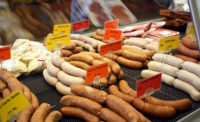Flexible packaging plays a vital role in protecting and preserving the freshness of meat, poultry, and seafood products and preventing food waste. Mono- and multilayer barrier films and laminates also deliver shelf impact and product differentiation, convenience features such as easy-peel/reseal, and a positive sustainability profile.
Although the light weight of films and laminates automatically imparts sustainability advantages versus heavier rigid packaging, many flexible substrates are sourced from petrochemicals, contain more than one material, and are challenging to recycle. With plastics viewed negatively by many consumers, the demand for more environmentally friendly substrates is pushing innovations in the industry. At least one supplier believes the interest in sustainability is causing a shift in the package design process. Instead of designing the package and then fine-tuning it to improve its environmental attributes, sustainability data is being used to guide design decisions from the beginning.
Innovations include compostable, renewably sourced, and recycled-content materials. One pilot project provides barrier shrink film with 100% recycled content. The process converts plastic waste into basic chemical elements and then repolymerizes it into food-grade material, which is recycled post-use to create a circular loop. The first adopter of the film, Cranswick PLC, a UK meat and poultry supplier, uses it to wrap whole-bird products. The modified-atmosphere package extends shelf life, allowing the use-by date to be doubled to 14 days. The effort is part of Cranswick’s Second Nature commitment to become the world’s most sustainable meat business. It also makes progress toward an EU target for all plastic packaging to be reusable or recyclable in a cost-effective manner by 2030.

Westaway Sausages Ltd., another sustainability pioneer from the UK, adopted paperboard trays in 2016 and shifted from polyvinyl chloride (PVC) cling film to compostable polybutyrate adipate terephthalate (PBAT) in June 2020. The fully certified (EN 13432) compostable packaging earned the Innovation of the Year Award in the UK Packaging Awards 2020 competition. The PBAT film composts in home and industrial settings. “It breaks down completely to leave just valuable biomass and no harmful residues,” says Charles Baughan, managing director at Westaway Sausages. He adds, “In our testing in our garden compost, this took less than 60 days.”
Branding advises consumers the packaging is certified compostable. Messaging has evolved from on-pack disposal instructions to a printed message on the film itself. “We are now looking at a four-color logo on the film,” Baughan says. He predicts, “There will be a nationally recognized logo in the future similar to the scheme being introduced in Ireland.”
Based in rural southwest England where home composting is above the UK national average, the change to compostable packaging puts the company in sync with consumers and ahead of looming deadlines. Baughan explains, “The weekly collection of food waste from all households will be mandatory by the end of this year [2022] in England. Furthermore, certified compostable packaging will be included in this waste stream by the end of next year. This will provide for a countrywide consistent approach to waste management.” The change to compostable packaging also differentiates the company in export markets, a substantial part of its business. “We export to a number of island nations that have strict legislation on import of plastic packaging,” Baughan says.

The adoption of compostable packaging has been good for business. Overall, sales are up 36%. In some export markets, Baughan says, “We have seen sales more than double. We see people are choosing brands that share their values.” As a result, the company is tripling its capacity to 15 tons per day.
Westaway considered PVC and polyethylene (PE) films but determined recycling rates were poor. Baughan explains, “We realize that not all packaging waste ends up where it should, PBAT is a solution to the issue of fugitive waste.” The PBAT film offers the same shelf life as PVC or PE films, may protect product color better, and works well on the frozen retail packs that ship to export markets. “The film . . . remains flexible at very low temperatures [and] is better than PVC in this respect,” he says.
Since it introduced PBAT film, Westaway Sausages has expanded its use to more products. “We are also using the new film and trays to cut logistics and temperature-controlled distribution costs and achieve better shelf utilization,” Baughan says.
Sustainable innovations haven’t stopped with the adoption of PBAT film. Westaway Sausages has launched a certified compostable bag. Made from potato starch, it can serve a dual purpose as a liner for a food waste caddy.




